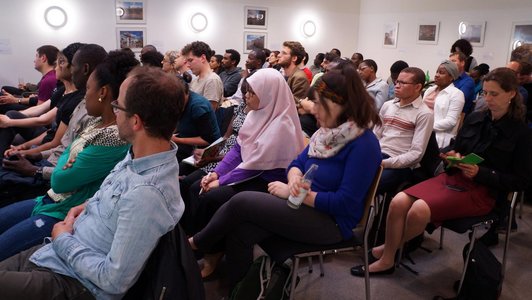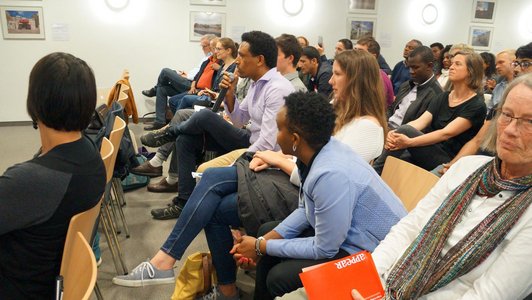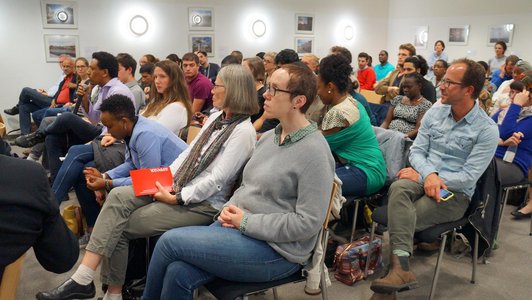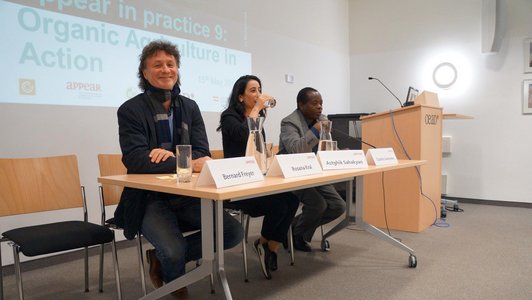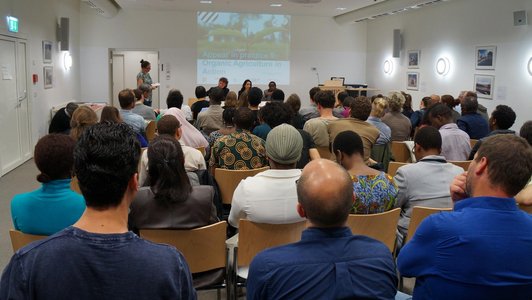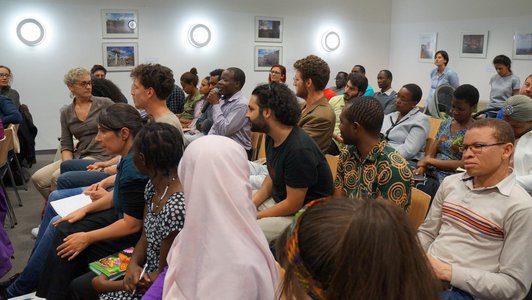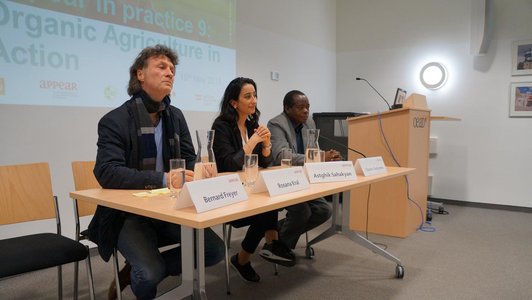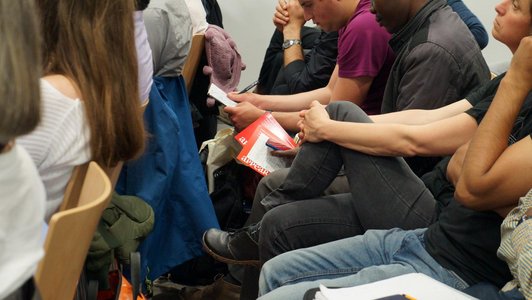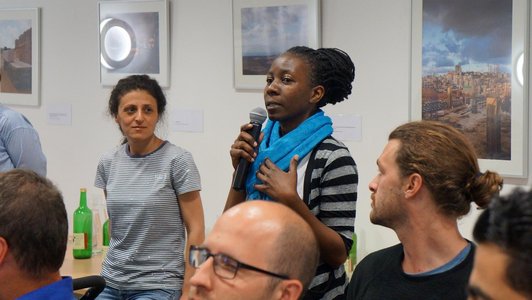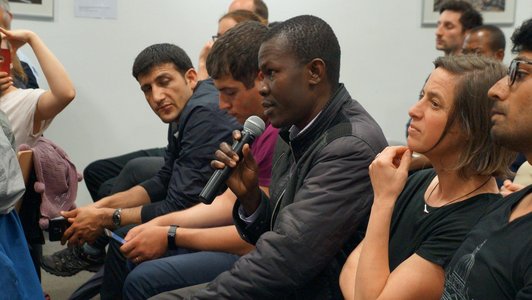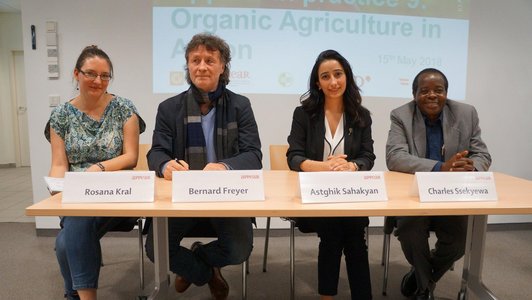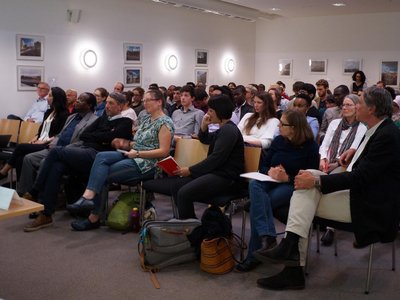

As a well-known knowledge driven farming method, organic agriculture strives towards sustainability through improved soil fertility and biological diversity while prohibiting synthetic pesticides and fertilizers, antibiotics, and genetically modified organisms. Steadily increasing in popularity, organic agriculture continues its global boom today. This means each year there are more organic farmers, rising numbers of organically managed land, growing organic markets, and further political recognition. This boom in organic farming demands skilled human resources at all institutional and organisational levels. During the APPEAR in practice event on the 15th of May, current developments and challenges in organic agriculture were discussed with partners from two APPEAR projects in Armenia and Uganda.
The organic situation differs between these two countries. Currently there are only 60 certified organic farms in Armenia, while there are more than 300,000 in Uganda. The area farmed organically amounts to 20,000 ha in Armenia, in comparison to the last decades’ expansion in Uganda, adding up to more than 260,000 ha.
The Division of Organic Farming at the University for Natural Resources and Life Sciences (BOKU) is implementing an APPEAR project with the Armenian National Agrarian University in Armenia and the Mountains of the Moon University in Uganda. Both projects focus on the facilitation of sustainable agriculture education, training, curricula and demonstration and research farm development in a transdisciplinary way.
At the start of the event, the coordinator of the two APPEAR projects and head of the Division of Organic Farming, Bernhard Freyer, described how the academic partnerships are embedded in the work and philosophy of the division. He also emphasized, that a rethinking of teaching and a reorientation of curricula content are necessary. This change is essential because the transformation of agricultural production towards sustainable food systems requires a holistic understanding of the complex interrelations and social realities in agriculture. The cooperation with the Armenian National Agricultural University and Mountains of the Moon University in Uganda also brings new perspectives in teaching and research for the Division of Organic Farming and the BOKU.
Astghik Sahakyan, researcher at the International Center for Agribusiness Research and Education (ICARE) in Yerevan, then gave an introduction to the Armenian context. Since organic agriculture provides opportunities for rural areas, the government there has a strong interest and defined it as a priority sector in the national “Sustainable Strategy Program for Agricultural and rural Development, 2010-2020”. However, there is no national organic action plan and only limited state support for the sector development. Local certification bodies and regulatory mechanisms to control organic labelling in the market are weak. Generally for small scale farmers certification is expensive leading to the fact that they are producing organically but are not recognized. Extension services for farmers, especially in the transition phase from conventional to organic cultivation are lacking. Another challenge is the low level of awareness and trust towards organic products in Armenia. Astghik Sahakyan stressed the high export potential due to worldwide growing demand for organic and the increased interest in agro-tourism.
The Armenian APPEAR project is titled Building Organic Agriculture in Armenia; Improving the knowledge and skills of organic stakeholders through participatory curriculum development and outreach (BOAA). BOAA has been created to help deliver the need for an increase in organic agriculture professionals skilled for research and practice in the Armenian context. The Armenian government, in collaboration with the EU and the Austrian Development Cooperation has recently launched support for increasing organic agriculture to mitigate marginalized people in impoverished areas, to better handle small farm sizes within the country and ensure the conservation of water, soil and biodiversity. To fulfill this need BOAA has been designed as a transdisciplinary project developing and implementing an Armenian organic master’s program with place-based, stakeholder involved curriculum.
In the Ugandan APPEAR project, Prof. Charles Ssekyewa has worked for many years in the organic sector. He headed a number of international research and development projects in Uganda dealing with sustainable farming practices, being promoted in the country since the 1980s. Organic farming started officially in Uganda in 1994 and a few years later the National Organic Movement (NOGAMU) was established. The national certification body UGOCERT was accredited by the EU in 2007. Charles Ssekyewa emphasized that much has already been achieved in the organic sector in Uganda. However; currently the sector is stagnating, due to the lack of national policies, especially with regard to legislation on organic production standards. Low investment in the production and marketing of organic food and high accreditation costs are further hindering organic growth. As in Armenia, organic farming is poorly institutionalized at the university level, not to mention a lack of funding available for research on locally adapted and relevant methods.
In Uganda the APPEAR project Strengthening of Higher Education, Research and Community Outreach in Agro-Ecology in the Rwenzori Region in Western Uganda (AER) is being implemented in the Rwenzori Region with the Mountains of the Moon University, Fort Portal. The main project objective is to build capacities in higher education, research and community outreach in the field of agro-ecology adapted to the Rwenzori region and to establish a master’s curriculum. These activities should counter the enormous challenges - over exploitation of its natural resources, high population growth rates and poverty among the majority of the smallholder households - with the collaborative elaboration of solutions with local stakeholders. Both of these projects incorporate a systemic perspective involving stakeholders and their demands. All project partners are engaged in active and participatory roles in influencing the progress and outcomes of the projects, taking over ownership.
For Astghik Sahakyan and Charles Ssekyewa, the development and implementation of a transdisciplinary master’s program in agroecology means an important step towards the professionalization and institutionalization of organic agriculture in Armenia and Uganda. The event took place in collaboration with the Centre for Development Research and the Division Organic Farming at University of Natural Resources and Life Sciences, Vienna.
Panellists:
Bernhard Freyer
Univ. Prof. Dr. Bernhard Freyer heads the Division of Organic Farming as well as the working group of Transdisciplinary Systems Research at the University of Natural Resources and Life Sciences, Vienna and has been a Senior Fellow at the University of Minnesota in the USA since 2011. His research focuses on systems theory and societal change within the context of organic agriculture and low input systems in Northern and Southern countries. His most recent research is on the sustainability of monasteries, farmer-consumer partnerships, ethics in the organic agro-food system, consumer behavior, climate change and smallholder farmer systems (in the tropics). He has organized and has headed several national and international research projects, is guiding PhD and master’s theses since more than 25 years and offers lectures in a broad field of topics within organic agriculture, methods and theories in social sciences. Furthermore he is a reviewer in several journals in the field of social sciences, ethics and ecology.
Astghik Sahakyan
Astghik Sahakyan graduated from the Agribusiness Teaching Center (ATC) at the International Center for Agribusiness Research and Education (ICARE) Foundation in Yerevan, Armenia. Since 2017, she has been working in ICARE’s research department on the project Building Organic Agriculture in Armenia. Additional agribusiness research projects she has been involved with, such as curriculum building for a greenhouse short-course, have mainly focused on value chain analysis and stakeholders' needs assessments. She also is a teaching assistant at the ATC in the courses “International Economics” and ”Statistics for Managers”, and is the communications manager of the Armenian chapter of the Young Professionals for Agricultural Development (YPARD) movement.
Charles Ssekyewa
Prof. Charles Ssekyewa is a Ugandan specialized in tropical and subtropical horticulture, crop science and organic agriculture with a special emphasize on integrated pest management, agro-ecosystem analysis and molecular virology. Previously he served as Research Scientist in the National Agriculture Research Organization (NARO) for 14 years, as Pioneer Dean for the Faculty of Agriculture for 6 years, and Director of Research for Uganda Martyrs University for 4 years. He headed a number of international research and development projects and now is involved within the AER project at the Mountains of the Moon University, Fort Portal. Charles Ssekyewa was the General Secretary for the International Society of Organic Agriculture Research (ISOFAR), Chairman Uganda Organic Certification Company Board of Directors and Associate Professor of Agriculture for the Agro-Ecology Master’s Degree Programme of Uganda Martyrs University.
Facilitator: Dr. Rosana Kral, Centre for Development Research (CDR), University of Natural Resources and Life Sciences, Vienna.

